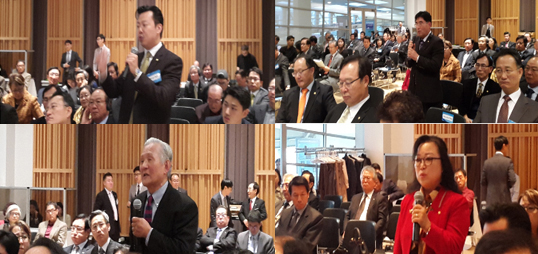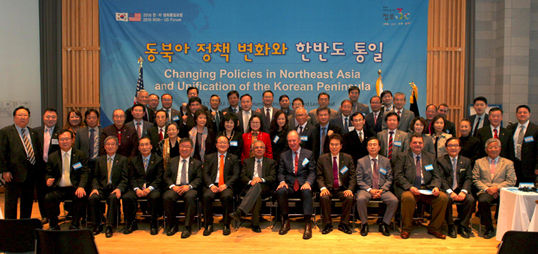“Change in Northeast Asian Policy and Unification of Korean Peninsula” after the election in the US
To seek measures for Korea-US cooperation and effective ways of inducing change in North Korea in accordance with policy changes after the election in the US, the “Korea-US Peaceful Unification Forum 2016” was held on November 17 at the Alfred Lerner Hall at Columbia University in the City of New York.
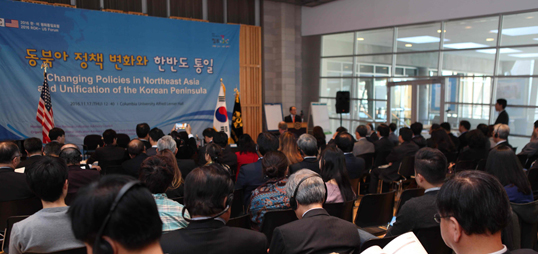
View of the event
This forum was hosted by the NUAC New York Chapter, proceeding with great attention to the participation of around 120 people including heads of chapters in the American region, council members, Korean leaders and compatriots, and students and professors of Columbia University. Ten experts from Korea and the US had a heated debate on the overall topic of 『Changes in Northeast Asian Policy and Unification of the Korean Peninsula』 in △Session 1: Situation of the Korean Peninsula and Possibility of Change in North Korea and △Session 2: US Policy on Northeast Asia and Korea-US Alliance.
This forum proceeded in the following order: △opening address by Jeong Jae-geon, Head of the New York Chapter; △congratulatory address by Kim Ki-chol, Vice-chairperson of the Council of America, and; △keynote lecture by Yoo Ho-yeol, Executive Vice-Chairperson.
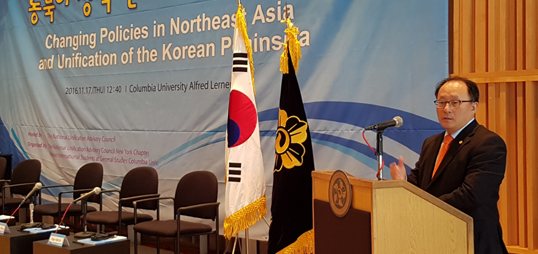
Executive Vice-chairperson Yoo Ho-yeol giving a keynote lecture
In his keynote lecture on the topic “Let's open an era of unification of the Korean peninsula through denuclearization of North Korea and strengthened Korea-US alliance,” Executive Vice-chairperson Yoo Ho-yeol emphasized the role of the US in changing North Korea and further achieving unification in the Korean peninsula.
"We thank the US for saving Korea, which was in a crisis during the Korean War, and for becoming a major axis in its miraculous growth. I look forward to a more mature and powerful Korea-US alliance," Executive Vice-chairperson Yoo said.
Executive Vice-chairperson Yoo also expects the Korea-US cooperation to play a crucial role in sanction and pressure policies for the denuclearization of North Korea, noting that the strong will of the US after the 5th nuclear experiment was especially remarkable. "Let us achieve denuclearization through consistent and powerful North Korean policy in the future," he stressed.
According to Executive Vice-chairperson Yoo, since president-elect Trump promised 100% Korea-US cooperation in a phone call with President Park right after the election, the Korea-US alliance will continue in the future without faltering. “I look forward to America's wholehearted cooperation until the Korean peninsula is united," he added.
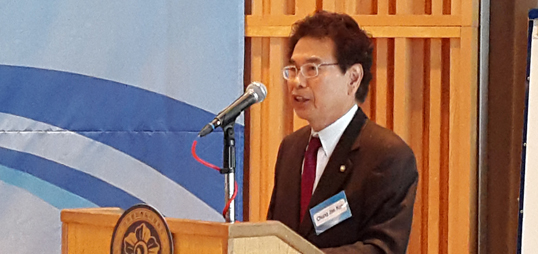
New York Chapter Head Jeong Jae-geon giving an opening address
Head of New York Chapter Jeong Jae-geon, who hosted this forum, stressed that, along with the cooperation of both countries for the stability of Northeast Asia, it is important for the international community to display the will to impose sanctions against North Korea's nuclear experiments.
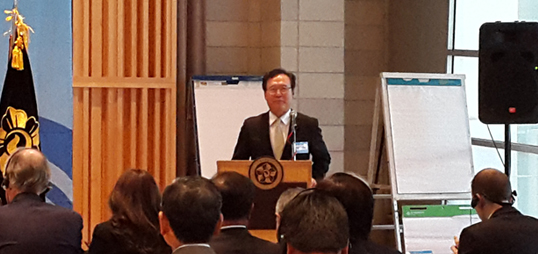
Kim Ki-chol, Vice-chairperson of the Council of America, giving a congratulatory address
"I hope that, through this forum, cooperative measures by both countries for the denuclearization and change of North Korea are established, and ways to advance the unification of Korea are prepared," said Council of America Vice-chairperson Kim Ki-chol, looking back at the meaning of this forum.
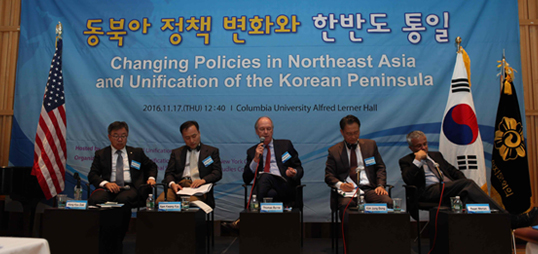
Session 1: Situation of the Korean Peninsula and Possibility of Change in North Korea
Session 1, which was held under the topic “Situation of the Korean Peninsula and Possibility of Change in North Korea,” was chaired by Professor Hong Kyu-dok of Sookmyung Women's University; it proceeded with presentations and discussions by Nam Kwang-kyu, Professor at Korea University, Thomas Byrne, President of the Korean Society, Kim Jung-bong, Chair Professor at Hanzhong University, and Rajan Menon, Professor at the City University of New York.
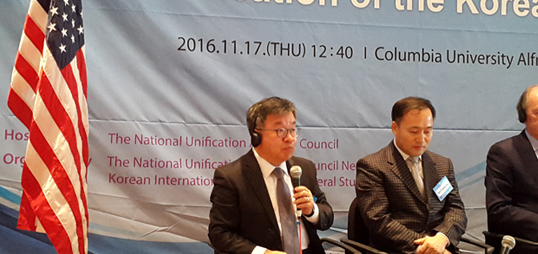
Session 1 Chair Hong Kyu-dok, Professor of Sookmyung Women's University
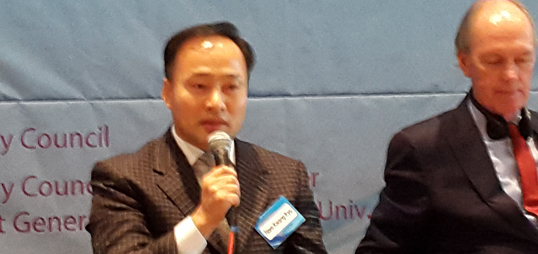
Nam Kwang-kyu, Professor of Korea University
According to Professor Nam Kwang-kyu, China must know that if its lax sanctions continue, North Korea's nuclear weapons will threaten Northeast Asia and ultimately connect directly to China's security problem. "China must actively participate in sanctions against North Korea's nuclear weapons," he added.
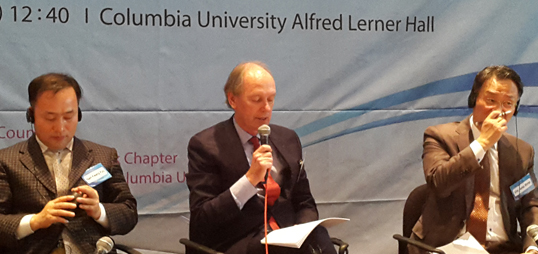
Thomas Byrne, President of Korean Society
President Thomas Byrne noted that, economically speaking, it is only a matter of time before North Korea collapses (changes). Sanctions by the Security Council have a cumulative effect when carried out over a long period of time, and there is a need to think about more effective means of imposing sanctions for the denuclearization of North Korea, he added.
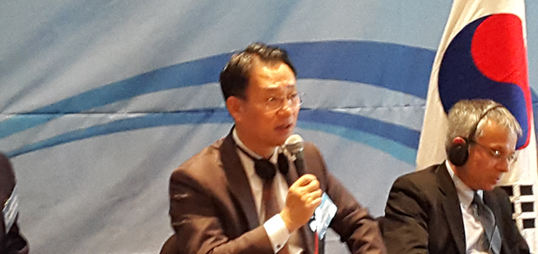
Kim Jung-bong, Chair Professor of Hanzhong University
"While what we can do now is impose sanction through the UN, China is providing North Korea with huge support through the Chinese border. Thus, if there isn't strong sanction imposed by China, then the UN sanction against North Korea might be much less effective," Professor Kim Jung-bong said, expressing concern.
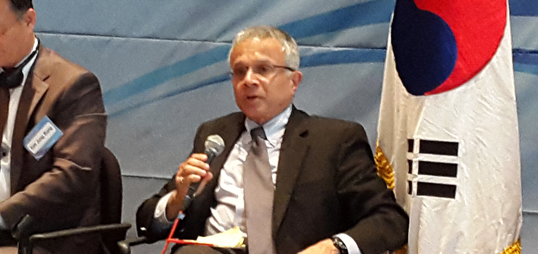
Rajan Menon, Professor of City University of New York
Professor Rajan Menon believes that North Korea must be given an incentive for it to denuclearize. “There needs to be an incentive for North Korea to renounce its nuclear weapons — for example, giving an economic incentive or decreasing military presence at DMZ — to reduce conflict between North and South Korea,” he said.
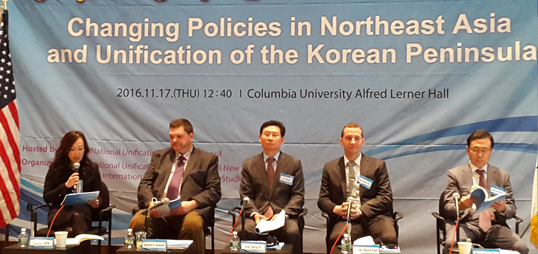
Session 2: US Policy on Northeast Asia and Korea-US Alliance
Session 2 was held under the topic “US Policy on Northeast Asia and Korea-US Alliance” and chaired by Sue Mi Terry, Executive Director of Bower Group Asia. It included presentations and discussions by Steven Noefer, Chief Director of the Korea Society, Lee Sang-il, Chair Professor at Dankook University, Isaac Stone Fish, Senior Fellow of Asia Society of Foreign Policy Magazine, and Park Jong-chul, Senior Researcher at the Korea Institute for National Unification.
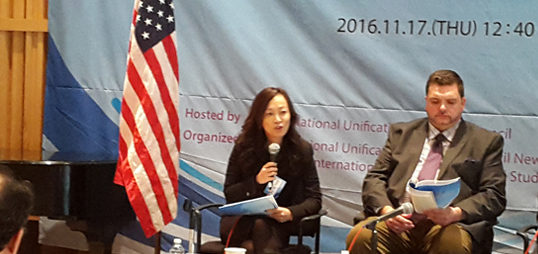
Session 2 Chair: Sue Mi Terry, Executive Director of Bower Group Asia
"In addition to carrying out the existing sanctions, the next step should be to improve upon the loopholes of the existing sanctions and place more individuals and organizations on the sanction list so that North Korea is forced to choose between only either nuclear arms or preservation of the regime," Executive Director Sue Mi Terry said.
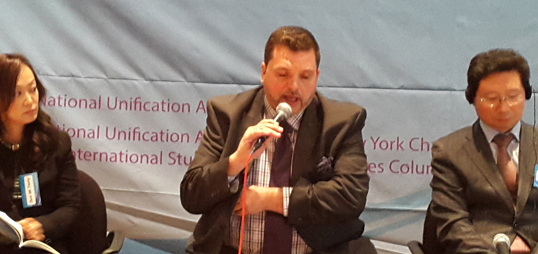
Stephen Noerper, Chief Director of the Korea Society
According to Director Stephen Noerper, for the next several years, countries in Northeast Asia have to progress by pioneering new paths amid tensions resulting from the upcoming Trump administration. "The most challenging situation is that North Korea is currently leading the international society into a tense situation by continuing to carry out nuclear arms and missile experiments and parading its technology to surrounding countries. The added problems of the rise of China and conflict in the South China Sea and East China Sea, progress of North Korea's nuclear and missile capability, and risky US-Philippines alliance will be a major challenge for the next American president," he added.
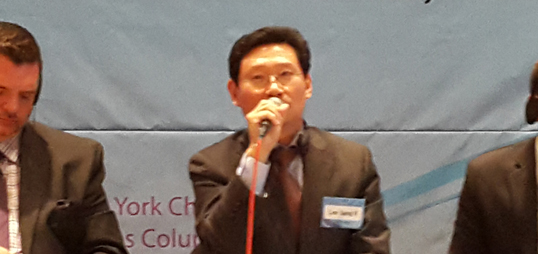
Lee Sang-il, Chair Professor, Dankook University
Professor Lee Sang-il noted that, at this point, the Korean government must, regardless of lame duck, take various diplomatic and security measures to deploy smoothly the terminal high altitude aerial defense system (THAAD) and to urge the new American president and administration to make the strengthening of alliance the priority in its agenda and execute it in order to obstruct North Korean nuclear weapons and maintain peace in the Korean peninsula.
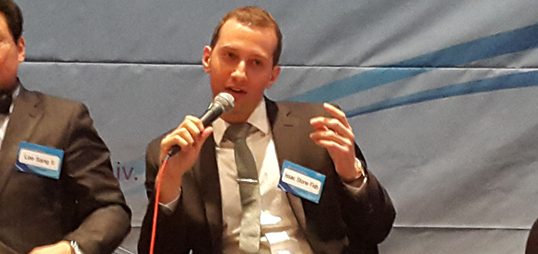
Isaac Stone Fish, senior fellow, Asia Society of Foreign Policy Magazine
According to Senior Fellow Isaac Stone Fish, China will not give up North Korea because it gains a lot from North Korea; in order to resolve this problem, a diplomatic policy toward China must be reconsidered, he added.
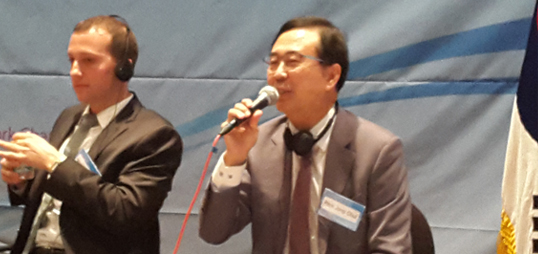
Park Jong-chul, Senior Researcher at the Korea Institute for National Unification
"I think it is necessary to increase the efficiency of nuclear deterrence of North Korea, which forms the core of the Korea-US alliance. The US will face the challenge of having to secure the confidence of the Korea-US alliance through nuclear deterrence while silencing the controversy of nuclear proliferation in East Asia," Senior Researcher Park Jong-chul said.
At this forum, various policy alternatives were proposed regarding the direction of Korea-US cooperation under the Trump administration and effective ways of inducing change in North Korea.
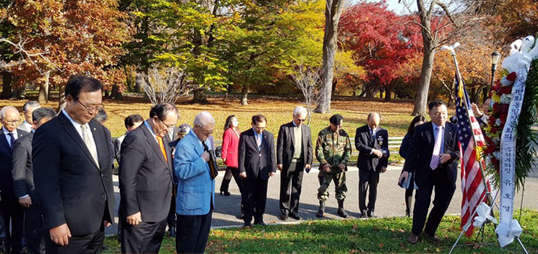
Executive Vice-chairperson Yoo Ho-yeol having a minute of silence after offering flowers to the Korean War Memorial Monument
Meanwhile, before the forum event, Executive Vice-chairperson Yoo Ho-yeol offered flowers to the Korean War Memorial Monument in Kissena Park, New York along with Vice-chairperson Kim Ki-chol, chapter heads of 20 regions in America, and officers of the veterans’ association.

















